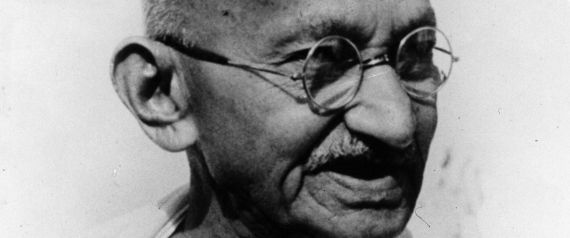
Karam Komireddy
www.huffingtonpost.in
15 May 2015
It has been almost 70 years since the assassination of Mahatma Gandhi. The day is observed sombrely every year, but if we are to honour the father of the nation, we must vigorously contest the distortions of history that are going largely unchallenged in today's India. The killing of Gandhi on 30 January 1948 was not the act of a lone madman. At the age of 78, Gandhi was passionately advocating tolerance and tirelessly disputing the demands of those who wished to transform India into what Nehru called a "Hindu Pakistan". Nathuram Godse, the assassin whose bullets ended Gandhi's life, was the agent of an ideology seeking to establish its supremacy by eliminating its most formidable adversary.
"Sixty-eight years on, the ease with which the RSS has gone about sanitising its past must put India to shame."
The fount of that ideology was the Rashtriya Swayamsevak Sangh (RSS). And the most tenacious obstacle to the RSS's dream of forging a Hindu state in India was Gandhi. After India's partition, Gandhi's influence over the Muslims who migrated to Pakistan naturally diminished. His moral authority over the people and government of India, however, remained strong; and he used his bully pulpit to prod India to transfer assets to Pakistan and provide security to Muslims. This confirmed his standing, in the eyes of the RSS and its ideological progeny, as an enemy of the Hindus. As Godse admitted at his trial for the murder of Gandhi, "I consider[ed] it a religious and moral duty to resist and, if possible, to overpower such an enemy by use of force".

Sixty-eight years on, the ease with which the RSS has gone about sanitising its past must put India to shame. The Right Wing organisation now denies any complicity in the killing of Gandhi. Its grudging admission that Godse had been a longstanding member of the RSS is accompanied by the dubious claim that he quit the organisation long before he pulled the trigger on Gandhi. As "evidence" of its innocence, it cites the findings of an independent commission of inquiry instituted in 1966 to investigate the circumstances of Gandhi's assassination. But the RSS's self-exculpatory claims fall apart when subjected to closer scrutiny.
First of all, it is important to remember that the RSS has no formal membership application. Anyone who turns up at its meetings and affirms faith in its beliefs is a member. That Godse joined the RSS is beyond dispute because the organisation admits he had been a member. It is equally indisputable that he shared the RSS's belief in Hindu supremacy. It is for the RSS to prove that Godse quit the organisation. To date, it has not produced a shred of evidence to demonstrate that he did.
"It was only in the 1990s that new information about Godse's relationship with the RSS began to surface."
Secondly, the Jeevan Lal Kapur Commission's "exoneration" of the RSS rests primarily on the deposition of one witness -- who in any case believed that the organisation should have been banned long before the assassination of Mahatma Gandhi. As the Commission's report noted, the "RSS and militant Hindu Mahasabha leaders" created "conditions... conducive to strong anti-Gandhi activities including a kind of encouragement to those who thought that Mahatma Gandhi's removal will bring about a millennium of Hindu Raj."
But if the Kapur Commission did not find the RSS culpable beyond a reasonable doubt, it is because it concluded its inquiry long before fresh evidence came to light.
It was only in the 1990s that new information about Godse's relationship with the RSS began to surface. In 1994, Gopal Godse, Nathuram's younger sibling and a co-conspirator in the assassination plot, disclosed that his elder brother was anxious to protect the RSS, which had been "like a family to us". "[Nathuram] said in his statement that he left the RSS", Gopal continued. "He said it because... the RSS were in a lot of trouble after the murder of Gandhi. But he did not leave the RSS". Gopal denounced the "cowardice" of those disputing his brother's unbroken membership of the RSS. Corroborating Gopal's statement is the influential pro-RSS scholar Dr Koenrad Elst who, in his 2001 book Gandhi and Godse, wrote that "Nathuram contrived to create the impression that the RSS had little to do with him, simply to avoid creating more trouble for the RSS in the difficult post-assassination months."
The RSS, politically ascendant and devoted to "Hinduness", is creating an environment in which we are expected to assess it on its own questionable terms. But to succumb to its demands is to lose a little bit of the "Indianness" that is the legacy of Mahatma Gandhi. The RSS cannot forever hide behind a report that, in this specific instance, is rendered obsolete by fresh evidence. If a commission with a remit similar to the one handed to Justice Jeevan Lal Kapur were to be constituted today, we can be almost certain that it will find the RSS culpable beyond a reasonable doubt.


कोई टिप्पणी नहीं:
एक टिप्पणी भेजें